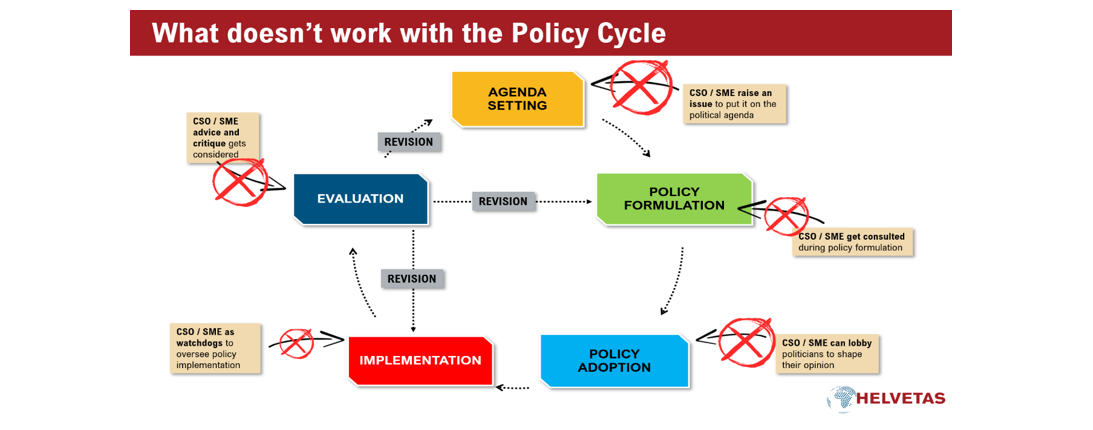In recent years, many countries have witnessed a decline of democracy and fundamental freedoms and a shrinking space for civic engagement. In such environments, civil society organizations (CSOs) must explore new ways and strategies to continue advocating for positive social change and to push back against these restrictions.
What must be done differently in restricted spaces so that advocacy works? The Helvetas Regional Advocacy Network (RAN) discussed this question with local partner CSOs from Bosnia and Herzegovina and Serbia during a webinar in June.
The broken policy cycle
Despite declines in democracy, many CSOs continue to advocate in a traditional way based on the assumption that functional institutions and policymakers are willing to listen and engage in public dialogue. However, many state institutions and decisionmakers increasingly ignore CSOs and their advocacy efforts – or even show hostile behavior against those who ask questions, raise demands and request public debate.
New laws and regulations hinder civil society actors from speaking up and engaging, at times even criminalizing these actions, while politicians and state media fundamentally question the legitimacy of CSOs to influence public opinion making, including through smear campaigns. At the same time, the little space that is left for public engagement gets occupied by government-owned NGOs.
Consequently, CSOs find it increasingly difficult to make change happen, since effective advocacy requires access to public information, to decision-making processes and to decision-makers. While the traditional policy cycle – agenda setting, policy formulation and adoption, implementation and evaluation – offers many opportunities for CSOs to participate and yield influence, these entry points are increasingly closed or occupied by those who seek to protect the status quo. At the same time, donors ask for tangible, quantifiable results in the form of legal and regulatory changes. Hence, CSOs must find new ways to advocate.

Serbia: Lack of implementation, risk of instrumentalization
In the case of Serbia, restrictions exist throughout the whole policy cycle. So the dilemma for Serbian CSOs is whether they should continue seeking meaningful dialogue with decisionmakers or shift towards open confrontation. Even when policies are designed through a participatory process, they hardly ever make it to the stage of implementation. A recent example is the Law on Social Entrepreneurship: Adopted in early 2022, the law should create a conducive legal framework for the several hundred social enterprises in the country. However, two years later, less than 10 social enterprises are registered under the new law, as Dejana Stevkovksi from Civic Initiatives in Serbia explains. Stevkovksi says the main reason for the slow uptake is that the government did not show any effort to support registration and roll out the agreed support program.
This example shows that even when CSOs get invited to co-create policies, they may have little influence on whether a policy gets eventually implemented or not. When there is no space for critical public monitoring of policy implementation, CSO advocacy is bound to fail. Instead, many CSOs feel increasingly instrumentalized by their governments, who engage with civil society only ostensibly and because the EU integration process requires them to do so.
This lack of progress experienced by traditional policy influencing and monitoring might be a key reason for the rise of informal civic movements. These movements can mobilize citizens beyond the traditional ways – particularly around specific, time-bound issues. In the case of Serbia, they have been partly successful in recent years (e.g., the Polekol movement). Hence, CSOs are poised to explore new models of cooperation with informal groups and movements so that they can move beyond their traditional ways of working.
Bosnia and Herzegovina: Political apathy versus concrete successes
Due to a highly complex political system, endemic clientelism, corruption and state capture, CSO advocacy in Bosnia and Herzegovina faces persistent challenges. Campaigning success hinges on tangible policy changes and societal impact, yet achieving such outcomes remains elusive. But when advocacy fails to produce immediate and substantial results, its perceived effectiveness decreases. According to Dario Jovanović from the Centre for Civic Initiatives in Bosnia and Herzegovina, this leads to the paradoxical situation where (failed) CSO advocacy contributes to general political apathy rather than encouraging people to take action themselves.
However, innovative and multifaceted approaches still sometimes lead to success: Local mass protests forced the government to cancel substantial investments in small hydropower plants along small rivers. Likewise, public petitions and concerted efforts of various civic actors helped to bring about a reform of the national election law, although this took more than eight years to accomplish.
But broad mobilization and bottom-up campaigning don’t guarantee success: In Sarajevo, petitions, protests and criminal charges were unsuccessful in keeping a potentially harmful kerosene storage facility from becoming operational.
Flexibility and openness as keys to success
There are commonalities in both country contexts, including: (1) the fight against corruption and state capture as a main stumbling block for effective advocacy; (2) the EU integration process as a sometimes enabling, sometimes hindering factor for policy influencing; and (3) that the only major campaigning successes were achieved by environmental movements, mobilizing broad masses and building genuine, powerful grassroots movements.
This does not mean that more traditional, institutionalized CSOs need to dissolve and reinvent themselves from scratch. However, their advocacy may become more effective if they are open to learning from and engaging with informal, spontaneous movements. At the same time, this may also help to rebuild trust between CSOs and citizens, as well as among CSOs. According to Jovanović, this mainly requires one quality: “Flexibility is the key word for our future advocacy – flexibility in action, in funding and in less bureaucracy.”
About the Authors
Gorana Radovanovic is the Team Lead for the Active Civil Society Together project at Helvetas Eastern and Southeastern Europe.
Csilla Schalbert is the Country Manager for Helvetas Bosnia and Herzegovina.
Bernd Steimann is the Development Policy Coordinator and Senior Advocacy Advisor at Helvetas.


